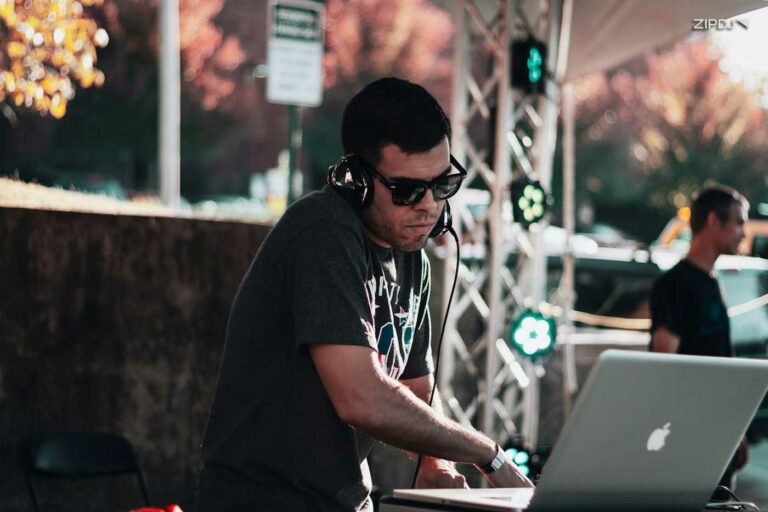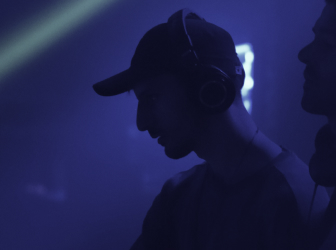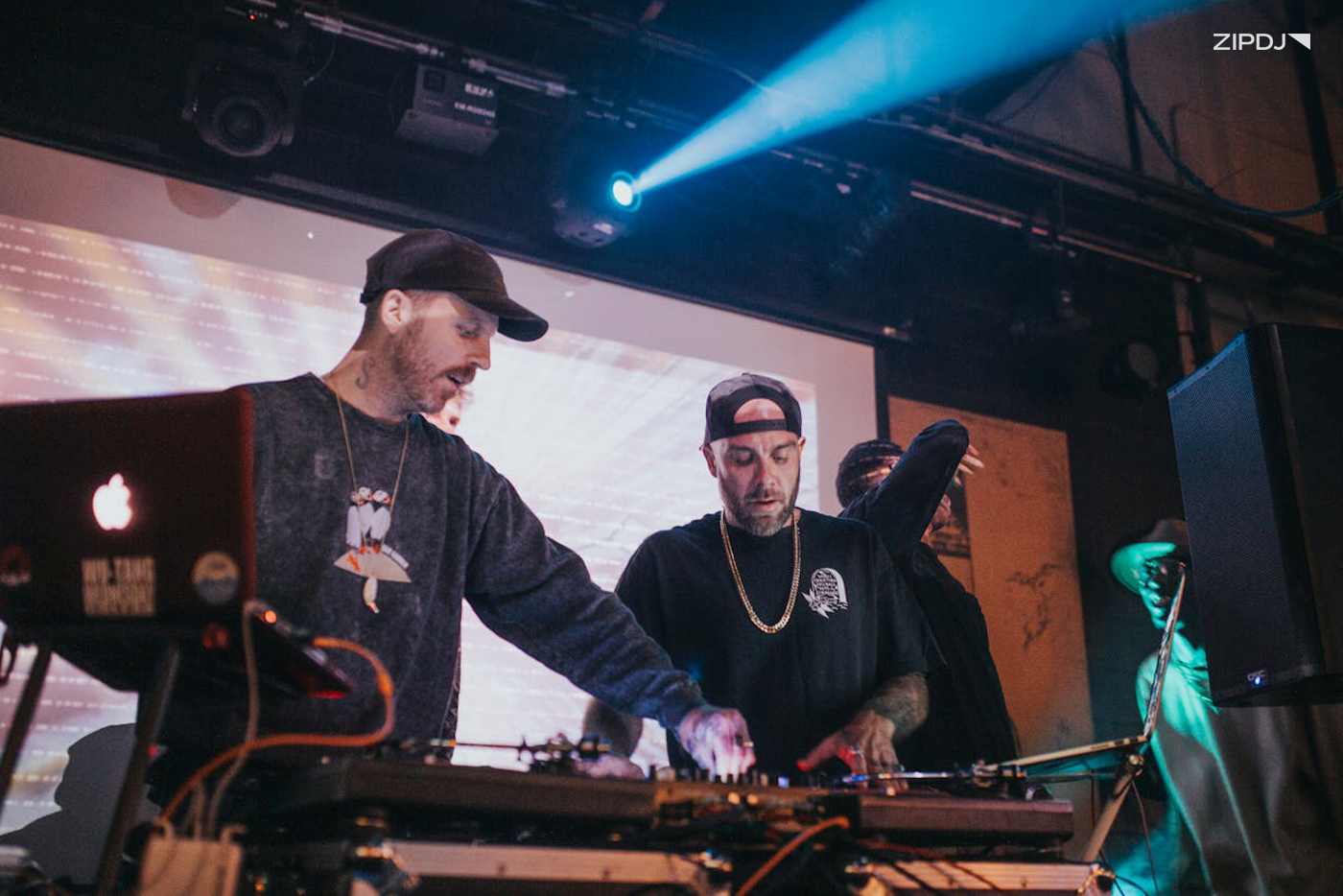How To Write A DJ Resume: A Step-By-Step Guide

Becoming a successful DJ requires a combination of talent, patience, and determination, with thousands of DJs often competing for the same gig.
Writing a compelling DJ resume covering your unique skills and history is vital for presenting your services to booking agencies and venue owners.
In this guide, we’ll break down everything you need to include in a DJ resume to deliver the best possible results and take your career in exciting new directions.

Why Write A DJ Resume?
While many people enjoy DJing as a hobby, learning how to make money as a DJ means understanding how to navigate the industry and attract the best venue owners.
This means showcasing your previous DJing performances and outlining what skills and music trends you bring to the table when performing a gig.
A DJ resume is the first port of call booking agents will reference when deciding whether or not to hire you for an upcoming event in a club or other venue.
This means writing a resume that event organizers are instantly drawn to, demonstrating your technical skills, level of DJing experience, and other relevant information.
Fortunately, you don’t need to hire a certified professional resume writer to attract potential employers and present your services in a great light.
DJ Resume Example
To help you get the ball rolling and pick up a DJ residency or work at private events, here’s a DJ resume sample you can use for reference:
Contact Information
David D Jay
(555) 12429234
Springfield, Ohio
www.daviddjay.co.
TikTok @daviddjay Twitter @daviddja7y123
Summary
A professional DJ with ten years of experience working in clubs and festivals in the Ohio area. Experienced with private events and creating playlists for private parties.
DJ Work Experience
Residency at Raveageddon, Ohio March 2016 – Present
- DJed at 150+ events with audience sized over 300
- Hosted private events with MCing services
- Discover new music for multi-genre events
Residency at The Hot Venue, Ohio October 2013 – 2016
- Hosted and organized a weekly daytime terrace party
- Consistently requested tracks from guests
- Received five-star ratings on TripAdvisor
Education
Bachelor’s degree in Music Theory
University of Ohio, 2005 – 2008
DJ Skills
Harmonic and Key Mixing
VR DJing
Scratching and beat juggling
Multi-deck mixing
Soft Skills
Hosting and announcements
Strong organizational and promotion skills
Event management
Certifications
Advanced Mixing Techniques Course, Udemy – 2020
Additional Information
Music production with Ableton Live
Sound engineering and mixing
Event recording and live streaming
Musical instrument live performance
Find out why professional DJs use ZIPDJ.
DJ Resume Template
Whether you’re a corporate DJ or breaking into clubs, resumes need to cover a variety of information, and this resume template to build up your profile in a few minutes:
Contact Information
[Full Name]
[Phone number]
[Professional email address]
[City, State]
[Professional website]
[Social Media Accounts]
Summary
[Briefly outline your core competencies, experience, and career achievements]
DJ Work Experience
[Job #1 Title], [Start date–End date]
[Company Name], [Location]
[Job Role] + [Duties & impact]
[Job #2 Title], [Start date–End date]
[Company Name], [Location]
[Job Role] + [Duties & impact]
Add more as required
Education
[Degree earned]
[Institution name], [Graduation year]
[High School Education]
[Institution name], [Graduation year]
DJ Skills
[Relevant skill]
[Relevant skill]
[Relevant skill]
[Relevant skill]
Soft Skills
[Relevant skill]
[Relevant skill]
[Relevant skill]
[Relevant skill]
Certifications
[Certification Name], [Host organization] – [Year completed]
[Certification Name], [Host organization] – [Year completed]
Additional Information
Include any other relevant information that isn’t covered in the above sections.
Expand your music library with a ZIPDJ subscription.
How To Write A DJ Resume (Step-By-Step)
Now that we’ve outlined the basic template for creating a DJ resume, it’s time to explore what you should include in each section.
Whether you’re learning how to become a DJ looking for your first gig or a seasoned professional, these are solid rules of thumb to remember.
Step 1: Choose A Resume Template
Whatever type of job you’re trying to land, if you don’t get your resume noticed by the right people, your chances of success will be slim to none.
This means selecting a DJ resume template that best matches your intentions and the event organizers whose attention you’re trying to capture.
You should start by selecting a professional resume template with the correct formatting to ensure clarity in presentation.
For example, booking agents will prioritize information such as your DJ prices, as this will impact their decisions around your potential for their needs.
Header sections should be concise, and your font choice should also be straightforward and professional to make your resume easy to read.
Step 2: Include All Points Of Contact
All resume examples require a point of contact for potential employers to contact them with follow-up questions and other queries.
For DJs, this means including more than simply an email address, physical address, and phone number; it is also vital to include social media pages.
Many DJs rely on their social media presence to develop their careers, and providing links to these pages will provide potential employers with a wealth of additional information.
If you’re using TikTok, X, Facebook, or other social media accounts, add these beneath your traditional contact points to help potential employers reach out quickly.
Find out how to set your DJ rates.
Step 3: Start With A Concise Summary
A professional summary captures the essence of your DJing services in a few short sentences and will help the reader quickly grasp what you’re all about.
Most hiring managers skim-read through resumes, so this is your chance to get their attention from the outset and pique their interest.
It should instantly convey your experience in the DJ industry without any fluff, highlighting your core strengths and track record of successful events.
If you’re unsure how to approach writing your resume summary, research writing tips to help you keep it tight and focused.
Step 4: Add Your Work History
One of the most critical sections of a DJ resume that needs to be right is the work history section, where your DJ career is explored in detail.
This is where persuasive tactics such as social proof come into play, with booking agents eager to see what track record you’ve already established.
You can highlight your prominent DJ roles, first emphasizing the most impressive venues and gigs so they stand out in this section.
Information such as crowd sizes, big-name DJs you’ve shared the booth with, and notable clubs and festivals will all help you stand out from the competition.
Take the time to refine this content to include action words and optimize it with keywords to revolutionize your text and make your DJ resume shine.

Step 5: Include Your Educational Background
Your educational background is also essential for hiring managers to see, even if this doesn’t directly relate to the art of DJing.
Higher education is not a requirement for DJs, but it will give a clearer indication of your intelligence level and commitment to learning.
Include your educational background up to the highest standard you’ve achieved, along with the names of your schools, subjects, and grades.
If you’re hoping to become a professional DJ working in radio or other broadcasting industries, degrees in media studies and other related subjects are a must.
Learn how to become a VR DJ.
Step 6: List Your DJing Techniques
Another crucial DJ resume section to get right is your DJ techniques, which outline your core technical skills and other notable competencies.
Staying on top of the latest industry trends is vital for remaining relevant as a DJ, and this section will likely be given a great deal of attention.
This includes showcasing your understanding of the most current DJ software and mastery of DJ equipment used in mainstream venues.
While you don’t need to include basic technical skills such as beatmatching, more advanced techniques should be listed, including:
- Phase mixing
- Key and harmonic mixing
- Scratching
- Mashups and remixes
- Sampling and loops
- Gain staging
- Mixing multiple music genres
- Tempo change transitions
- Multi-deck mixing
As you develop new DJing techniques over time, return to your DJ resume and revise it to include them in this section.
Step 7: Outline Your Soft Skills
DJ services are more than just their technical abilities; they require various soft skills to perform the DJ job to the highest possible standard.
Venue owners are looking for DJs with excellent customer service, and the best DJ resumes must highlight various interpersonal skills.
Here are a few examples of soft skills you should consider for your disc jockey resume:
- Teamwork and collaboration
- Effective time management
- Organizational skills
- Crowd management
- Active listening
- Strong sense of self-motivation
- Physical stamina
- Clear oral and written communication
These can be complemented by an understanding of DJ etiquette and a knowledge of how to engage with customers on the dance floor to maintain energy levels.
Many of these soft skills are as crucial to booking agencies and venue managers as understanding how to use technical equipment.
You can also refer the reader to supplementary material, such as video footage of your previous performances, highlighting your interpersonal abilities.
Step 8: Include Any Certifications
Your DJ resume should cover any industry-specific certifications you have achieved throughout your career, in addition to your formal education.
Excellent online DJ courses from highly credible institutions are available, and booking agents will be interested in learning more about them.
Online schools such as Point Blank Music School and Udemy are highly reputable resources for DJ education that can help you navigate the industry.
These courses demonstrate your ability to master the core mixing techniques and stay current with the latest music trends that define DJing.
Additional information that can be covered in this section of your DJ resume includes any industry awards or DJing competitions you’ve won.
If you have any media coverage, you can also include links to these in your resume to provide additional verification of your professionalism.
Likewise, other projects and collaborations should also be included, as these will highlight your ability to collaborate and work on creative projects.
Exploring the best DJ forums and online communities.
Step 9: Add Additional Related Abilities
There are many adjacent skills to DJing that potential clients will be keen to hear about when reviewing your DJ resume and deciding whether or not to hire your services.
Contemporary DJs are often multi-talented individuals with experience in a broad selection of related fields that relate to their primary interests.
Some expand their repertoire by becoming DJ producers and creating their own tracks to use in DJ sets or upload to streaming services.
Others venture into graphic design and other visual media, using these skills to create online content and physical flyers promoting upcoming DJ events.
Technical expertise, such as sound engineering, is also something potential employers will be interested in ensuring optimal sound quality at their gigs.
Some other transferable skills you can consider including in your resume if relevant include:
- Links to your mixes on SoundCloud and MixCloud
- Affiliations with industry organizations
- Sound system installation
- Music production
- Promoting music festivals
- Live performance
As your job history evolves, you can update this section accordingly as you gain more insights into how audio equipment works and learn new related abilities.
Step 10: Attach A Cover Letter
Last but not least, a compelling and eye-catching DJ resume must include a cover letter, which should function similarly to the opening summary.
You can apply many tips when creating your cover letter. It should be concise, engaging, and reflect your genuine brand and DJing style.
Start by ensuring your cover letter is formatted correctly, legible, and clear, using a well-spaced layout and neat font.
Your main accomplishments should be front and center, as these are your most vital selling points that will encourage booking agencies to continue reading your resume.
Next, the cover letter should break down your other core skills and experiences in a few short sentences tailored to the venue you’re applying to.
Avoid using the same cover letter for everyone you contact, and spend some time researching the clients to see what it is they’re looking for.
Summary
Launching a successful DJing career is the dream job for many people, and creating a compelling DJ resume is crucial for getting your foot in the door at major venues.
By applying the structure and rules outlined in this guide, you’ll increase your odds of getting noticed and breaking into the industry with higher-paying gigs.
As your career evolves, make sure you continually return to your resume and refresh the information to reflect your current level of skills and experience.
Not a member ?
Join Today for Unlimited Music Downloads. Visit zipdj.com for more information.



